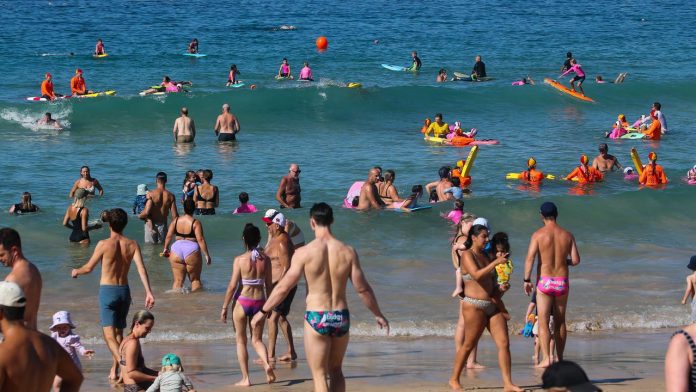As Australia braces for an unusually hot and wet summer, Aussies and tourists alike are rethinking their travel plans. This shift in climate is prompting travelers to adapt their experiences, with industry experts noting a significant impact on the country’s tourism industry. Rising temperatures, a higher likelihood of extreme weather, and the challenge of managing popular outdoor activities during unpredictable conditions are influencing how and when people choose to travel.
Changing Climate and Travel Trends
With forecasts from the Bureau of Meteorology predicting warmer days and nights across the country from November to January, tourists are keeping a close eye on the weather before committing to bookings. Rob Sharpe, a meteorologist from Sky News Weather, expects this summer’s temperatures to be among the top four warmest on record. This hotter-than-usual weather, paired with above-average rainfall in parts of eastern, western, and far northern Australia, is set to reshape the tourism landscape.
David Anderson, CEO of Big Red Group, which oversees booking platforms like RedBalloon and Adrenaline, explains, “The extreme weather that we’re seeing is a persistent threat to the tourism and experiences industry.” Australians, as well as international tourists, are now seeking water-based activities and booking closer to their travel dates to avoid potential cancellations due to severe weather.

Increased Demand for Water and Eco Experiences
As temperatures soar, tourists are gravitating toward experiences that help them stay cool. White-water rafting, for instance, has seen a 194% increase in bookings compared to last year. Eco and agricultural tourism are also witnessing a surge, with a 370% rise in interest as travelers seek out sustainable and culturally immersive activities. Anderson notes that this shift reflects the public’s growing interest in environmental responsibility and connecting with nature.
However, high temperatures and erratic weather have reduced the availability of certain activities, like hot air ballooning and skydiving, which depend on stable conditions. “The days these experiences can operate are becoming fewer,” Anderson shared, adding that travelers are now more focused on choosing flexible booking options to accommodate unpredictable conditions.

Adapting Travel Itineraries
Tourism operators are responding to these climate challenges by making operational adjustments. Intrepid Travel’s Managing Director, Brett Mitchell, shared that the company’s product design changes yearly to account for environmental conditions. Destinations in regions like the Kimberley are now offered for shorter seasons as the windows of favorable weather continue to narrow.
To improve customer experiences, local guides employed by Intrepid are empowered to adapt daily schedules based on the weather. For instance, outdoor activities are often rescheduled to cooler morning hours on days forecasted to reach extreme temperatures. Mitchell emphasizes that communicating these changes effectively with travelers leads to positive experiences, as they appreciate the safety considerations and adaptability.
Challenges for Tour Operators
Australia’s tour operators have faced a difficult few years, dealing with natural disasters, storms, and the impacts of the pandemic. For some, last year’s peak season storms severely impacted their bookings, especially on the Gold Coast and in Far North Queensland, where tourism numbers dropped significantly. According to Anderson, some operators in Port Douglas were “absolutely obliterated” and have only recently resumed business.
The report from Zurich Financial Services and Mandala Partners highlights the financial strain on Australia’s tourism sector, noting that half of the country’s tourism assets face significant climate and natural peril risks. Insurance premiums for these businesses have skyrocketed, with some operators seeing year-on-year increases of up to 200%. This challenge is hitting small businesses particularly hard, as they struggle to balance rising operational costs with the demands of a volatile climate.

Looking Forward
As climate conditions intensify, Australians and tourists must approach travel with greater flexibility. While some outdoor activities are more limited, the tourism industry is working diligently to adapt and create safer, enjoyable experiences for visitors. With more travelers booking sustainable and climate-conscious experiences, the future of Australia’s tourism industry remains resilient, albeit ever-evolving.
Contact Information
For those planning a trip, booking through platforms like RedBalloon, Adrenaline, or Intrepid Travel can offer flexible options that cater to changing weather patterns.
𝐒𝐮𝐛𝐬𝐜𝐫𝐢𝐛𝐞, 𝐥𝐢𝐤𝐞, 𝐬𝐡𝐚𝐫𝐞, 𝐚𝐧𝐝 𝐜𝐨𝐦𝐦𝐞𝐧𝐭 𝐭𝐨 𝐬𝐭𝐚𝐲 𝐭𝐮𝐧𝐞𝐝 𝐭𝐨 𝐲𝐨𝐮𝐫 𝐟𝐚𝐯𝐨𝐫𝐢𝐭𝐞 𝐧𝐞𝐰𝐬 𝐜𝐡𝐚𝐧𝐧𝐞𝐥!
📌YouTube- https://www.youtube.com/@serendibnews
📌Facebook – https://web.facebook.com/serendibnews.com.au/
📌Instagram – https://www.instagram.com/serendibnewsau
📌TikTok – https://www.tiktok.com/@serendibnews
📌Twitter- https://x.com/SerendibNewsAu
📌LinkedIn- https://www.linkedin.com/in/serendib-news-au/
📌WhatsApp Group – https://tinyurl.com/2as67j52
📌WhatsApp Channel – https://tinyurl.com/bdf8f2jr


